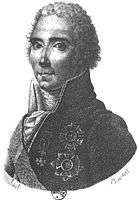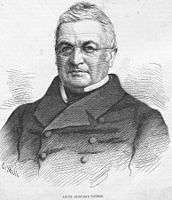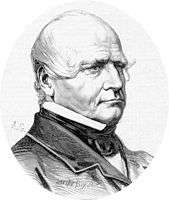Hippolyte Passy
Hippolyte Philibert Passy (15 October 1793 – 1 June 1880)[1] was a French cavalry officer, economist and politician.
Hippolyte Philibert Passy | |
|---|---|
 | |
| Deputy of Louviers | |
| In office 1830–1851 | |
| Minister of Finance | |
| In office 10 November 1834 – 18 November 1834 | |
| Minister of Finance | |
| In office 2 August 1836 – 6 September 1836 | |
| Minister of Finance | |
| In office 12 May 1839 – 29 February 1840 | |
| Minister of Commerce | |
| In office 22 February 1836 – 5 September 1836 | |
| Personal details | |
| Born | 15 October 1793 |
| Died | 1 June 1880 (aged 86) |
| Nationality | French |
| Spouse(s) | Claire Fourmont-Tournay |
| Children |
|
| Mother | Jaquette Pauline Hélène d’Aure |
| Father | Louis François Passy |
| Relatives |
|
| Profession | Economist |
Early life
Passy was born into a aristocratic Catholic family.[2]:41 His father, Louis François Passy,[3]:5 was recevuer general des finances (Receiver General of Finance), an important office in the Ancien Régime.[4]:222 His mother was Jaquette Pauline Hélène d’Aure.[5] Her brother, the Count d'Aure, was a riding master who fought for France in Egypt and Saint-Domingue.[2]:35
One of his brothers, Justin Félix, was a soldier and the father of Nobel Peace Prize winner Frédéric Passy.[2]:35 Another brother, Antoine François, was a botanist and geologist.[6]:10
Military career
In 1809, Passy joined the Cavalry School in Saumur.[7] He joined the French military in 1812,[7] and took part in Napoleon's Russian campaign.[2]:35 After leaving the military, Passy was a journalist until 1830.[7]
Political career
In October 1830, he was elected Deputy for Louviers.[7][1] After joining the Moderate Liberals, he served as reporter on the 1831 and 1835 Budgets.[7]
Passy held various ministerial positions in the July Monarchy and the French Second Republic.[2]:35 He served as Minister of Finance on several occasions:
- 10 November 1834 – 18 November 1834[8]:113
- 2 August 1836 – 6 September 1836 (acting)[8]:113
- 12 May 1839 – 29 February 1840[8]:114
From 1835 to 1839, he was Vice-President of the Chamber.[7] During this time, he also served as Minister of Commerce from 22 February 1836 until 5 September 1836.[8]:131 From 16 April 1839 until 12 May 1839, he was President of the Chamber of Deputies.[1]
In 1843, Passy joined the Chamber of Peers.[9] He became Minister of Finance again during the 1849 Presidency of Napoleon III, and retired from politics after the 1851 coup d'état.[7]
In 1878, he was president of the International Congress on Provident Societies, a group dedicated to discussing economics and finance.[10]
Personal life
Passy married Claire Fourmont-Tournay, the daughter of Gisors's mayor, Eustache Fourmont-Tournay.[11]:255 They had a son, Edgar, who worked in the Ministry of Foreign Affairs as an embassy secretary.[12] He was a member of the Société de l'histoire de France, nominated by Jules Desnoyers and his uncle Antoine.[12]
Both Passy and his brother Antoine were lifelong friends of Hortense Allart, the Italian-French writer.[6]:10 They met while visiting Regnaud de Saint-Jean d'Angély's widow near Paris.[6]:241 The brothers were helpful in helping Allart's husband become a local government architect.[6]:179
Selected works
- Des causes de l'inégalité des richesses. Paris: Pagnerre. 1848.
- Des formes de gouvernement et des lois qui les régissent. Paris: Librairie Guillaumin et cie. 1876.
References
- "Hippolyte, Philibert Passy - Base de données des députés français depuis 1789 - Assemblée nationale". www2.assemblee-nationale.fr. Retrieved 19 November 2019.
- Clinton, Michael. "Frédéric Passy: Patriotic Pacifist" (PDF). Journal of Historical Biography. University of the Fraser Valley. 2 (1). ISSN 1911-8538. Retrieved 18 November 2019.
- "Mémoires de la Société historique et archéologique de l'arrondissement de Pontoise et du Vexin". Société historique et archéologique de Pontoise, du Val-d'Oise et du Vexin. 1916.
- Garrioch, David (1996). The Formation of the Parisian Bourgeoisie, 1690-1830. Harvard University Press. ISBN 9780674309371. Retrieved 18 October 2019.
- "PASSY Antoine François | Cour des comptes". www.ccomptes.fr (in French). Retrieved 2 November 2019.
- Hansen, Helynne Hollstein (1998). Hortense Allart: The Woman and the Novelist. University Press of America. ISBN 9780761812135. Retrieved 18 November 2019.
- "Obituary". The Times (29898). 3 June 1880. p. 8.
- France, Société de l'Histoire de (1842). Annuaire historique pour l'année 1843 (in French). Paris: Renouard. Retrieved 18 November 2019.
- "The Paris papers of Sunday". The Times (18483). 19 December 1843. p. 4.
- "Latest Intelligence". The Times (29293). 28 June 1878. p. 5.
- Hersan, P. F. D. (1858). Histoire de la ville de Gisors (in French). Gisors: Lapierre. Retrieved 20 November 2019.
- Société de l'histoire de France, Volume 145 (in French). Paris: Jules Renouard. 1868. p. 33. Retrieved 7 December 2019.
.svg.png)



